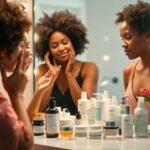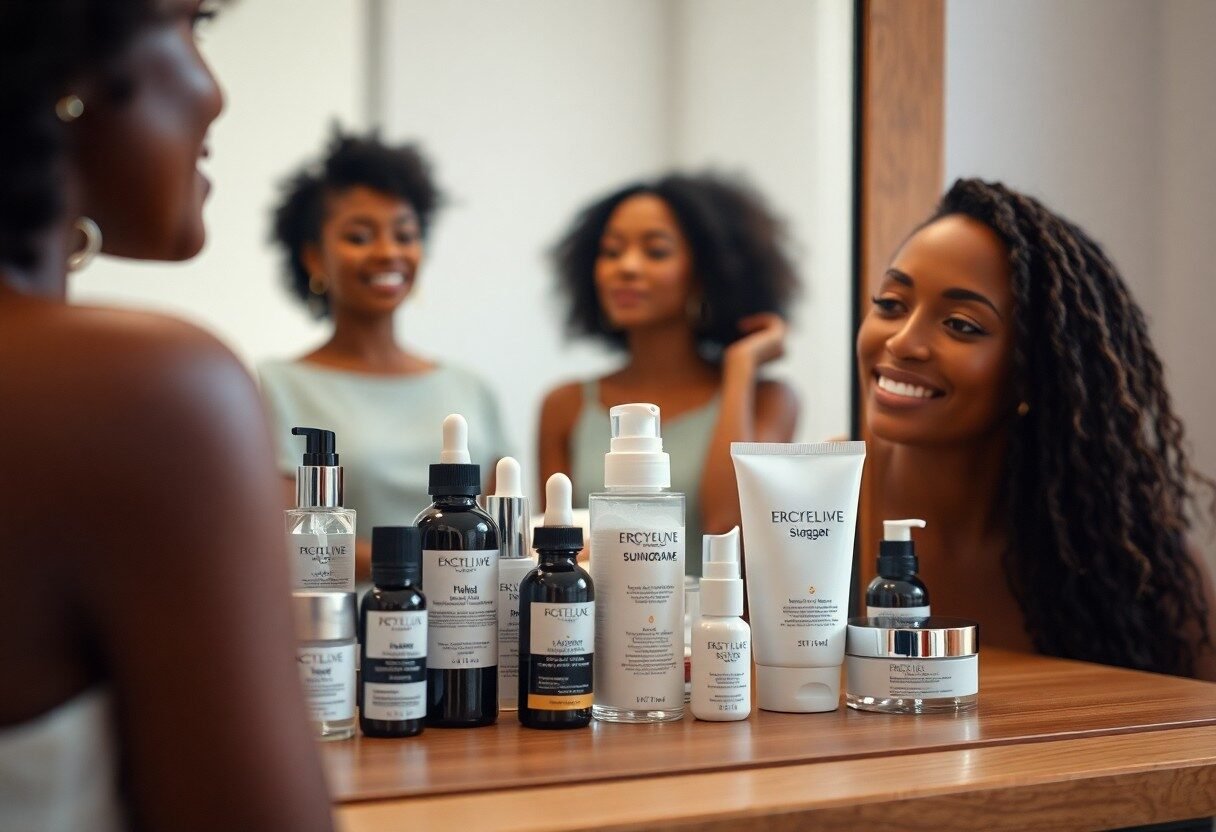
With the unique needs of our skin, it’s vital to choose skincare products tailored for women of color. I understand how factors like melanin levels and specific skin concerns can significantly influence our choices. In this post, I will share key ingredients and trusted products that can enhance your routine while addressing common issues such as hyperpigmentation and dryness. Join me as we explore the vitals that will help you achieve radiant and healthy skin.
Key Takeaways:
- Look for products with broad-spectrum sunscreens to protect against UV rays, which can affect skin tone and cause hyperpigmentation.
- Hydrating ingredients like hyaluronic acid and glycerin are important to maintain moisture and skin elasticity, especially for diverse skin types.
- Incorporate gentle exfoliants, such as lactic acid or fruit enzymes, to promote skin cell turnover and help reveal a brighter complexion.
- Opt for moisturizers with shea butter, cocoa butter, or oils like jojoba and argan that cater specifically to the needs of deeper skin tones.
- Pay attention to products formulated for melanin-rich skin to avoid irritation and inflammation that can lead to dark spots.
- Antioxidants such as vitamin C and E are beneficial for combating free radicals and promoting an even skin tone.
- Consider serums targeting specific concerns, such as dark spots or uneven texture, to enhance the overall skin appearance.
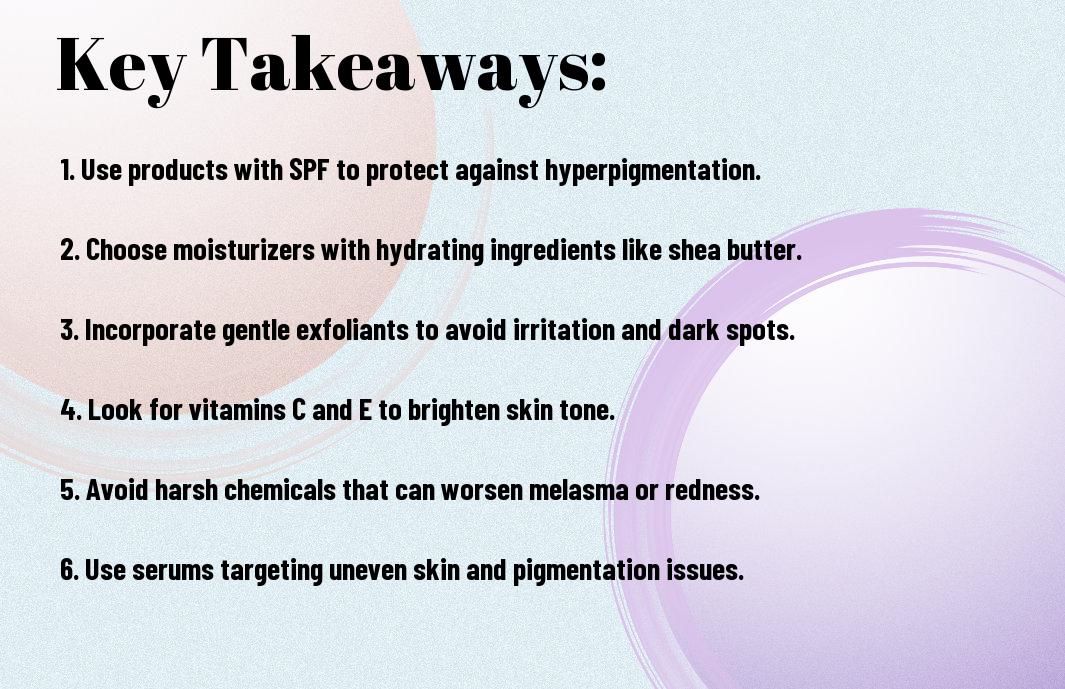
The Unique Skin Characteristics of Women of Color
Melanin and Its Protective Qualities
Melanin serves as a natural shield, providing women of color with greater protection against the sun’s harmful rays compared to those with lighter skin. This increased melanin production can help reduce the chances of sunburn and skin cancer, but it does not entirely negate the need for sunscreen. I always emphasize the importance of using a broad-spectrum sunscreen daily to combat the potential long-term effects of UV exposure, like premature aging and hyperpigmentation.
Common Skin Concerns and Conditions
Women of color often face specific skin concerns, including hyperpigmentation, keloids, and texture irregularities. Genetic factors may influence how our skin responds to various products and environmental stresses, which means tailored skincare solutions are key. Additionally, darker skin tones sometimes mask underlying conditions, making it vital to consult professionals who understand your unique needs.
Hyperpigmentation is a prevalent issue, often exacerbated by inflammation, acne scars, or hormonal changes. Keloids, a type of raised scar that emerges after an injury, are more common in darker skin tones, indicating the need for vigilant monitoring of any cuts or scrapes. Texture irregularities, such as rough patches or dullness, may stem from inadequate moisture retention. Combining targeted treatments and regular exfoliation can help even out skin tone and improve overall texture, making it vital to customize your skincare routine to address these unique challenges.
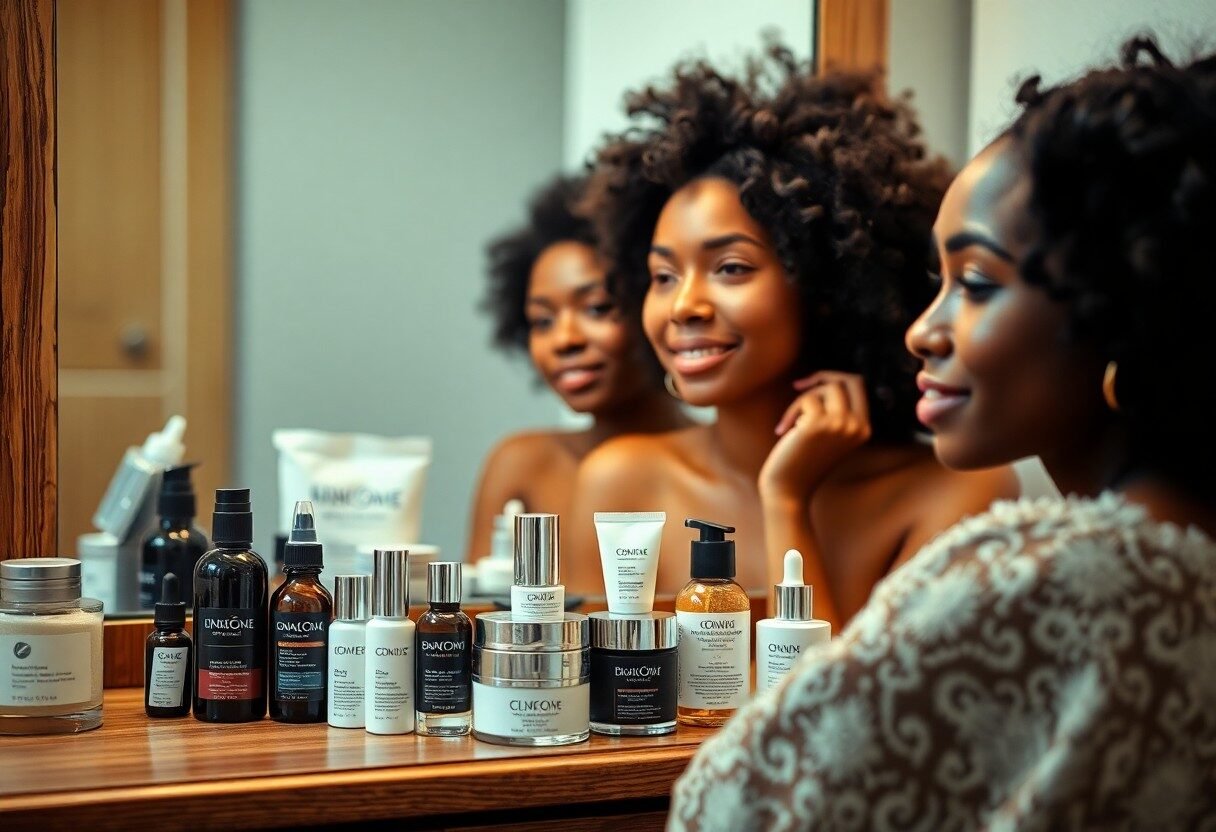
The Foundations of a Skincare Routine
Cleansing: Choosing the Right Formulation
Finding the perfect cleanser can be a game-changer for your skin. Aim for a gentle, sulfate-free formula that maintains your skin’s natural oils while effectively removing dirt and impurities. Opt for cream or oil-based cleansers if you have dry skin, whereas foaming gels might suit those with oily skin better. Just be cautious with strong exfoliating cleansers that could strip away important moisture.
Exfoliation: Breaking Down Barriers
Exfoliating properly can reveal a brighter, more even complexion. I recommend incorporating a gentle exfoliant into your routine to assist in shedding dead skin cells while promoting cell turnover. Look for products with alpha-hydroxy acids (AHAs) or beta-hydroxy acids (BHAs) that are effective yet not overly harsh.
For women of color, maintaining healthy skin often involves addressing hyperpigmentation. Regular exfoliation can diminish dark spots and uneven texture, ultimately allowing your natural glow to shine through. I often utilize chemical exfoliants, as they provide a thorough yet gentle approach compared to physical scrubs. This method not only helps in refreshing my skin but also in ensuring my products penetrate better for maximum benefits.
Moisturizing: Locking in Hydration
Effective moisturization is key to achieving plump, radiant skin. Use a moisturizer that suits your skin type, opting for lightweight gels if your skin is oily, or rich creams if it’s dry. Pay special attention to ingredients such as hyaluronic acid or glycerin, which attract moisture, ensuring your skin stays hydrated throughout the day.
When I select a moisturizer, I look for formulas that contain humectants and occlusives to both draw in and lock moisture. A well-chosen moisturizer can significantly enhance your skin’s hydration levels and prevent dryness or rough texture. For women of color, maintaining adequate moisture helps counteract the fatigue that skin can sometimes show due to environmental stressors, leading to a vibrant appearance. Consider also incorporating hydration boosters, like serums, for added moisture support.
Targeted Treatments Tailored for Diverse Skin Tones
Serums and Oils: Nutritional Necessities
Incorporating serums and oils into your routine is vital for meeting the unique hydration needs of melanin-rich skin. Look for products packed with vitamin C, niacinamide, or jojoba oil to enhance your skin’s texture and vibrancy. These potent ingredients work together to nourish and brighten your complexion while addressing specific issues like uneven texture and dullness. Applying these treatments regularly can deliver visible results, leaving your skin looking radiant and healthy.
Treatments for Hyperpigmentation: Effective Solutions
Dealing with hyperpigmentation can be particularly challenging, but targeted treatments can help you achieve an even skin tone. Incorporate products with hydroquinone, alpha arbutin, or azelaic acid into your regimen for effective lightening effects. I recommend starting with a patch test to ensure compatibility with your skin, as some ingredients may cause irritation. Consistent use can diminish dark spots and promote a more uniform complexion, allowing your true beauty to shine through.
For lasting results, consider using serums with retinol or glycolic acid that gently exfoliate and accelerate skin cell turnover. This approach not only treats existing hyperpigmentation but also helps prevent new spots from forming. When used alongside broad-spectrum sunscreen, which protects against UV damage that can worsen pigmentation, you create a powerful armor against uneven skin tone. The combination of these treatments, applied regularly, can significantly enhance your skin’s brightness, making a noticeable difference over time.
The Importance of Sun Protection in Skincare
Sun protection remains a non-negotiable step in any skincare routine, particularly for women of color. Melanin offers some natural protection against the sun’s harmful rays, but it doesn’t provide complete safety. The risks of UV damage, such as skin cancers and uneven pigmentation, loom large. Incorporating sunscreen with robust broad-spectrum protection helps to combat these risks, ensuring your skin remains radiant and healthy.
Debunking Myths About Sunscreen
Many believe that sunscreen is unnecessary for darker skin tones, assuming that melanin suffices as a protective barrier. This is a misconception. Regardless of skin tone, UV rays can still penetrate and cause damage, potentially leading to issues like hyperpigmentation and skin cancer. In fact, darker skin may not show sunburn as prominently, which can lead to a false sense of security. Regular sunscreen use is crucial for all skin types.
Finding the Right SPF for Darker Skin
Choosing an appropriate SPF isn’t about the number alone; it involves understanding how different formulations interact with deeper skin tones. Look for broad-spectrum options with an SPF of at least 30 that don’t leave a white cast—a common concern for women of color. Your best options might include tinted sunscreens or mineral-based formulas that better blend with your complexion.
As you search for the right SPF, consider testing different formulations to find what works best for your skin type. Many brands now offer sheer, lightweight, and non-greasy options specifically designed to work well without leaving residues that can clash with your natural skin tone. You might find that gel-based or spray sunscreens provide a more appealing texture and finish. Just remember, application should be generous and reapplied every two hours, especially during prolonged sun exposure; this ensures long-lasting protection while maintaining your desired glow.
Navigating Ingredient Lists: What to Embrace and What to Avoid
Beneficial Ingredients: Natural Boosters
In your quest for the best skincare, look for natural ingredients that cater specifically to your skin’s unique needs. Ingredients like jojoba oil, which mimics your skin’s natural sebum, and aloe vera, known for its soothing and hydrating properties, can work wonders. Shea butter is another fantastic choice, providing deep moisture while also having anti-inflammatory benefits. Including these ingredients can not only enhance your skin’s health but also address specific concerns like dryness and uneven tone.
Harsh Chemicals: Red Flags to Watch Out For
Stay informed about potentially harmful chemicals often found in skincare products. Ingredients such as sulfates, parabens, and fragrance can disrupt the skin barrier and lead to irritation, especially for women of color who may experience heightened sensitivity. Avoiding these irritants can significantly improve your skin’s overall condition and help minimize issues like eczema or hyperpigmentation that can be exacerbated by harsh formulations.
While those are just a few examples, it’s vital to probe deeper into the ingredients in your skincare products. Many women of color should specifically avoid ingredients like alcohol, which can dry out your skin, or triclosan, a synthetic antimicrobial that can cause disruptions in your skin’s natural microbiome. Additionally, heavy metals, often found in cheaper cosmetics, pose long-term health risks. The wiser you are about product content, the better equipped you’ll be to make informed choices that benefit your skin.
Makeup and Its Role in Skincare
Selecting Products That Complement Skincare
Choosing makeup products that enhance your skincare routine is paramount. Look for foundations with hydrating formulas that include ingredients like hyaluronic acid or glycerin, as they will not only provide coverage but also contribute to the moisture levels of your skin. Opt for non-comedogenic options to prevent clogged pores, which can lead to breakouts. Additionally, shades should match not only your skin tone but also its undertone—whether cool, warm, or neutral—to achieve a seamless blend that matches the texture and brightness of your complexion.
Common Makeup Mistakes for Women of Color
Women of color often encounter unique challenges in makeup application that can undermine skincare efforts. Selecting the wrong foundation shade stands out as a common mistake, leading to an ashy or overly orange appearance. Another issue arises from neglecting to consider skin types; products that work for oily skin might not suit dry or combination types, affecting both the look and health of your skin. Furthermore, forgetting to apply setting spray or powder can lead to a quick deterioration of your makeup, leaving you looking washed out or uneven throughout the day.
Many times, I’ve seen women of color struggle with mismatched shades, especially when brands tend to offer limited options. Ashy tones in makeup can overshadow the natural warmth of deeper skin tones. It’s also necessary to realize that the *finish* of your products matters; dewy foundations may work better for dry skins while matte formulas could enhance oilier complexions. Focusing on proper blending techniques and using tools designed specifically for your skin type can transform your makeup experience. The right combination of products not only enhances beauty but also allows your skincare routine to flourish.
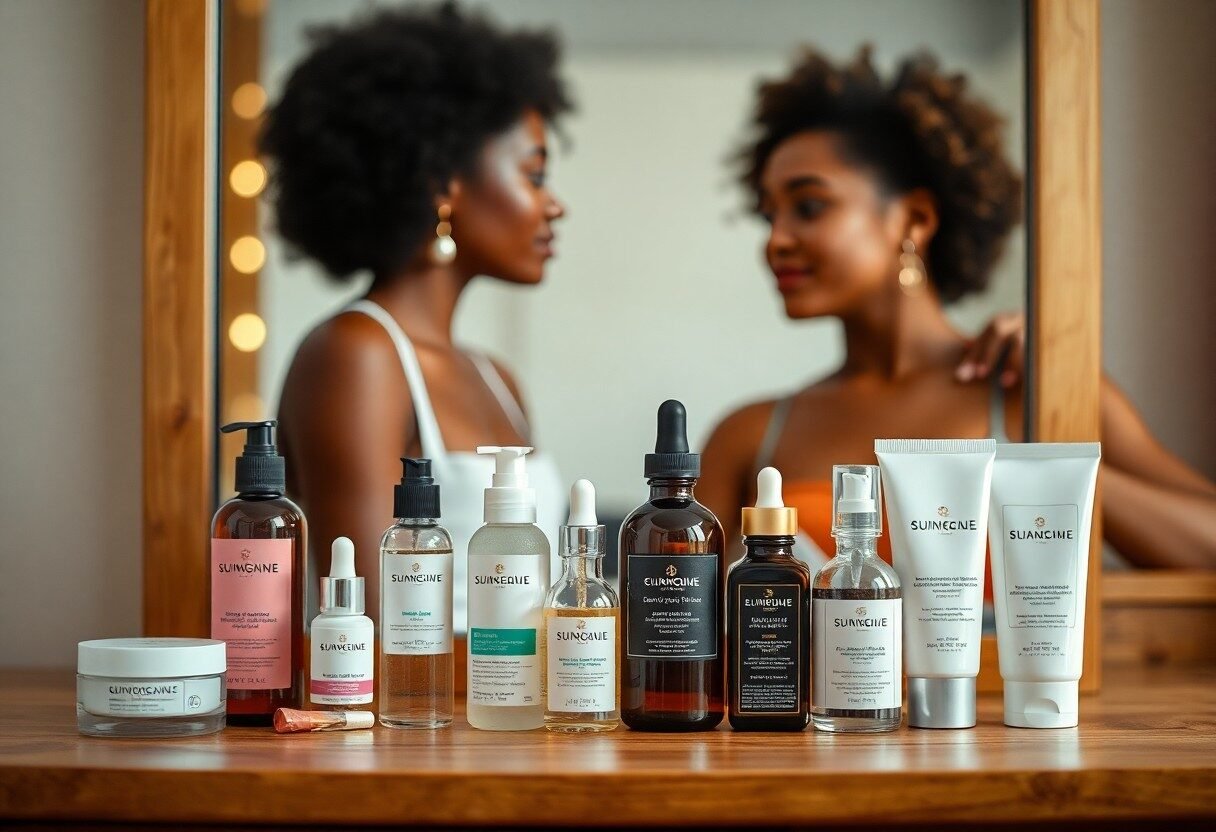
Cultural Influences on Skincare Practices
Traditional Remedies and Their Modern Applications
Many women of color draw from rich cultural heritages that feature time-honored skincare remedies, such as turmeric masks for brightening or shea butter for deep moisturization. These traditional treatments often incorporate natural ingredients readily available in their regions, showcasing a deep understanding of the skin’s needs. In today’s market, many brands are incorporating these ingredients by blending them into modern formulations, making them accessible while preserving their historical value.
Celebrating Diversity in Beauty Routines
Beauty routines are increasingly recognized for their diversity, allowing women of color to express their unique identities. Each culture brings its own rituals and preferred products to the table, whether it’s the vibrant natural oils celebrated in West African skincare or the herbal infusions popular in Asian beauty regimens. This diversity enriches the beauty landscape, allowing individuals to explore a variety of methods that resonate with their skin type, cultural background, and personal preferences.
By embracing diverse beauty routines, we not only broaden our skincare knowledge but also uplift various cultural practices and ingredients that may have been overlooked in mainstream beauty. For instance, the inclusion of African black soap or Indian neem oil indicates a shift towards a more global understanding of skincare. This celebration of diversity promotes inclusivity and offers exciting possibilities for customized skincare solutions tailored for various skin tones and concerns.
Embracing Skin Confidence: The Emotional Aspects of Skincare
Building Self-Esteem Through Skincare Choices
Your skincare routine can be more than just a series of products; it’s an opportunity to build self-esteem and embrace your unique beauty. By carefully choosing products that cater to your specific skin needs, you prioritize self-care. This intentionality fosters a deeper appreciation for your skin, reminding you that confidence can begin with the simple act of nourishing your complexion.
The Role of Community and Shared Experiences
Finding connection with others who share similar skin experiences can profoundly influence your skincare journey. Community support allows for open dialogues about products, techniques, and cultural rituals, fostering an inclusive environment where everyone feels valued. Not only can shared experiences provide practical advice, but they also boost motivation, making the journey to healthier skin a collective celebration.
Engaging in community discussions, whether through online forums or local meetups, allows you to swap skincare tips and product recommendations that resonate with diverse skin tones. Studies show that individuals who have supportive networks often experience enhanced confidence and satisfaction with their skin. For instance, sharing your successes or challenges can inspire others to embrace their unique beauty and reclaim their narratives surrounding skincare and self-acceptance. It’s in these intimate spaces that we learn that our skin journeys are not isolated stories but part of a larger tapestry of resilience and strength.
Summing up
Upon reflecting on the important skincare products for women of color, I believe it’s vital to acknowledge the unique needs of your skin tone and type. Sun protection, hydration, and products targeting hyperpigmentation are key to maintaining a healthy glow. I encourage you to explore nourishing ingredients like vitamin C and hyaluronic acid while being mindful of formulation compatibility with your skin. Prioritize your skincare routine to enhance your natural beauty, and remember that embracing your individuality is what truly brings out your radiance.
FAQ
Q: What are the vital skincare products for women of color?
A: Essential skincare products for women of color typically include a gentle cleanser, a hydrating toner, a vitamin C serum for brightening, a sunscreen with broad-spectrum protection, a nourishing moisturizer, and a targeted treatment for specific skin concerns such as hyperpigmentation or acne. Additionally, products containing ingredients like shea butter, niacinamide, and hyaluronic acid can be beneficial for maintaining healthy skin.
Q: How do I choose a moisturizer that works well for my skin type?
A: When choosing a moisturizer, consider your skin type first. For oily skin, opt for lightweight, gel-based moisturizers that won’t clog pores. For dry skin, look for cream-based moisturizers rich in hydrating ingredients like hyaluronic acid or glycerin. If you have combination skin, a balance of both lightweight and cream formulations may work best. Always check for non-comedogenic labels, especially if you’re prone to breakouts.
Q: Are there specific sunscreens recommended for women of color?
A: Yes, some sunscreens are formulated to blend seamlessly into deeper skin tones without leaving a white cast. Look for mineral-based sunscreens with zinc oxide or titanium dioxide, as well as tinted sunscreens that offer a broader range of shades. It’s important to choose a sunscreen with at least SPF 30 and that provides broad-spectrum UVA/UVB protection.
Q: How can vitamin C serum benefit women of color?
A: Vitamin C serum can be particularly beneficial for women of color as it helps to brighten the skin and even out skin tone. It can address issues such as hyperpigmentation and dark spots, which are common concerns for women with deeper skin tones. Additionally, vitamin C works as an antioxidant, protecting the skin from environmental stressors.
Q: What ingredients should I avoid in skincare products?
A: Women of color should be cautious about using products with harsh ingredients that may irritate the skin or exacerbate pigmentation issues. Avoid products containing alcohol, sulfates, and synthetic fragrances, as they can strip the skin of its natural moisture and lead to dryness or irritation. Instead, opt for gentle, hydrating formulas with soothing ingredients.
Q: How often should I exfoliate my skin?
A: It’s generally recommended to exfoliate 1-2 times a week, depending on your skin type. For sensitive or dry skin, once a week may be sufficient, while those with oilier skin may benefit from exfoliating twice weekly. Exfoliation helps to remove dead skin cells and can improve the appearance of uneven skin tone and texture. Choose a mild chemical exfoliant, such as AHAs or BHAs, to avoid damaging the skin.
Q: Can diet influence my skincare results?
A: Yes, diet can significantly affect your skin’s health and appearance. Consuming a balanced diet rich in antioxidants, vitamins, and healthy fats can promote glowing skin. Foods high in omega-3 fatty acids, such as fish and nuts, can help reduce inflammation. Adequate hydration and limiting processed foods and sugars can also contribute to better skin health.





